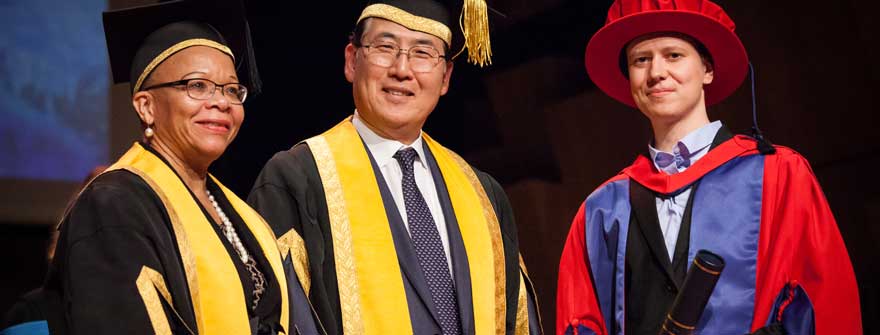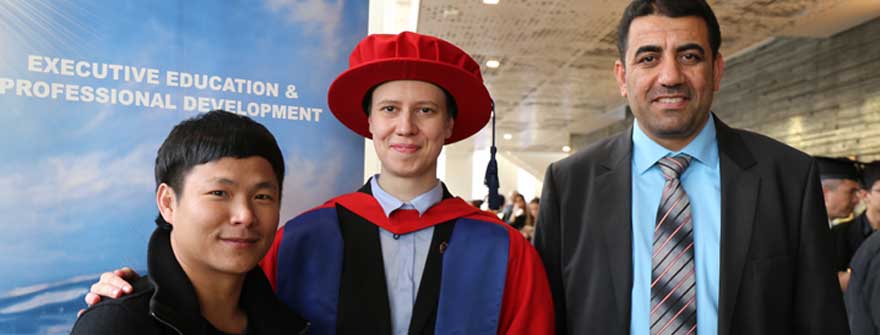Fellows' Works & Activities
The PhD Journey
The title of my PhD dissertation was ultimately as follows: “Criminal procedures and sanctions against seafarers after large-scale ship-source oil pollution accidents: a human rights perspective”. Development of the dissertation on such a challenging topic, in which different fields of law (penal law, law of the sea, and human rights law) meet, was excellent experience. I went through a wide range of emotions during this process – excitement, disappointment, anger, happiness – everything was there, and this “everything” was very valuable. I believe that, as a result, I have become stronger, wiser, more knowledgeable and skilled than I was before.
Of course, the journey is more important than the destination. Nevertheless, reaching the end was heart-warming as well. I successfully defended my PhD dissertation on the 10th of October last year and, consequently, joined the Graduation Class of 2016 on the 29th of that month.
The full text of my PhD dissertation is available online:
http://commons.wmu.se/all_dissertations/508/
An abstract is given below.
ABSTRACT
The international maritime community is highly concerned about the unfair application of criminal procedures and sanctions against seafarers, particularly after large-scale ship-source oil pollution accidents, because such unfairness may cause severe negative consequences for individual seafarers and the shipping sector in broader terms. A lot of work has already been done towards the elimination of this respective unfairness. Yet, unfair practice continues. This dissertation attempts to give new ideas as to how to facilitate the fair application of criminal procedures and sanctions against seafarers after large-scale ship-source oil pollution accidents.
The dissertation starts with the clear definition and comprehensive explanation of the standard of fair criminal procedures and sanctions against seafarers. The offered standard is: relevant human rights.
It continues with the analysis of whether or not those rules of UNCLOS and MARPOL which can be linked to criminal procedures and sanctions applicable against seafarers after large-scale ship-source oil pollution accidents are clear and comply with human rights. As a result, several deficient rules of UNCLOS and MARPOL are identified and corresponding recommendations on how to interpret these rules are given. Many of these recommendations are innovative because, when addressing the issue of unfair application of criminal procedures and sanctions against seafarers after large-scale ship-source oil pollution accidents, the international maritime community, so far, has predominantly focused on criticising particular EU and national laws and practices, instead of looking critically at the relevant rules of UNCLOS and MARPOL as well.
After analysing the relevant legal norms of UNCLOS and MARPOL, the dissertation turns to the long-standing discussion on the qualities of EU Directive 2005/35 on ship-source pollution, particularly to the controversy of whether the Directive conflicts with the MARPOL exceptions from liability, or not. The dissertation, inter alia, makes an original conclusion that the root cause of the controversy is the failure of the drafters of MARPOL to agree on the issue as to when, if ever, State Parties to MARPOL may adopt more stringent standards than MARPOL.
Some insight into relevant national laws and practices is provided by the dissertation, through the case study of four large-scale ship-source oil pollution accidents: the Erika, Prestige, Tasman Spirit and Hebei Spirit accidents. The case study shows that after all four accidents, seafarers were exposed to unfair criminal procedures and sanctions.
After this unfortunate finding, the dissertation analyses whether IMO/ILO Guidelines on Fair Treatment of Seafarers are capable of bringing considerable positive change in practice. A conclusion is reached that the Guidelines, per se, are not capable of bringing such change; however, some rules of the Guidelines are a good basis for further, more substantial development.
The dissertation ends with the revisiting of all research questions and providing user-friendly lists of main recommendations related to these questions. At the very end, a couple of overall conclusions and recommendations, which, at times, reach even further than only large-scale ship-source oil pollution offences, are given. One such recommendation is to develop three new IMO instruments: one binding (the International Convention for the Unification of Certain Rules Relating to Penal Liability in the Maritime Domain) and two non-binding (the Sanctioning Guidelines for Offences in the Maritime Domain and the Guidelines on Penal Proceedings Which Involve Seafarers).
Anete Logina
Latvia, 2009

